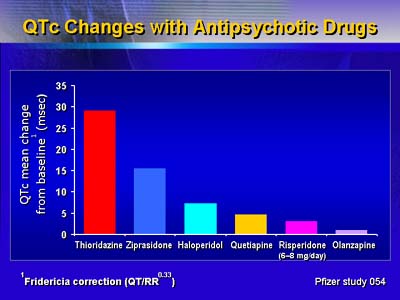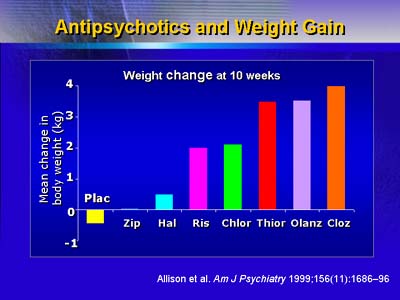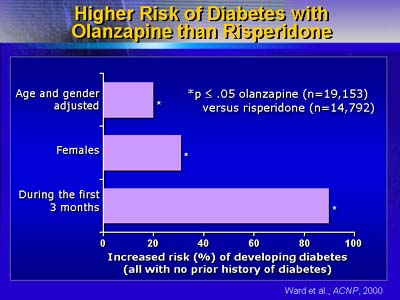Although the superior safety and tolerability of atypical antipsychotics has been discussed principally with regard to lower rates of extrapyramidal adverse effects and tardive dyskinesia, other issues may affect safety and tolerability. They include effects on QTc duration, weight gain, hyperglycemia, and dyslipidemias.
Dr. Chue noted that greater prolongation of mean QTc duration has been reported in patients treated with thioridazine, ziprasidone, or haloperidol than in patients treated with risperidone or olanzapine.

Weight gain also may be an adverse effect of some antipsychotics. Weight gain has been reported more frequently in association with chlorpromazine, thioridazine, clozapine, and olanzapine than with risperidone, ziprasidone and haloperidol (Allison et al., 1999). Weight gain may reach plateau as late as 52 weeks in some olanzapine-treated patients (Beasley, et al., 1999) and as late as 48 weeks in some clozapine-treated patients (Henderson, et al., 2000).

Citing health risks associated with elevations of blood glucose and blood lipid concentrations, he pointed out that dyslipidemias and new-onset or worsening of type 2 diabetes have been reported more frequently in association with clozapine and olanzapine than in association with risperidone, quetiapine, and ziprasidone.

Although the results presented by Dr. Chue are still problems under discussion, there were no major criticisms comments after his presentation. He believes that optimal selection of an appropriate antipsychotic should take into account a patient's general condition, presence of known risk factors, benefit/risk balance, and potential need for regular monitoring of metabolic parameters. These considerations should result not only in the decrease of the overall cost of treatment, but also in improvement of patients' attitudes about pharmacotherapy.